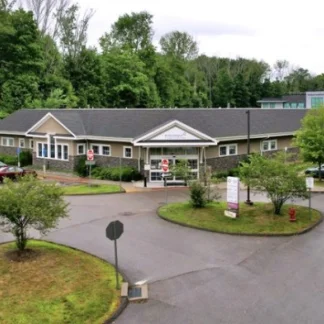Joshua Center Thames Valley
Joshua Center Thames Valley is a private rehab located in Norwich, Connecticut. ...
Backus Center for Mental Health is a drug and alcohol rehab and medical facility located in Norwich, CT. They provide inpatient substance abuse and mental health treatment.
Addiction-related services available include inpatient co-occurring disorder treatment and outpatient substance abuse treatment.
Inpatient co-occuring disorder treatment This is an 18-bed unit that treats individuals suffering from psychiatric disorders like depression, bipolar disorder, anxiety, postpartum psychosis, and a co-occurring disorder of substance abuse. The medical team works together to restore individuals to their highest level of functioning as quickly as possible
Outpatient substance abuse treatment In this program there is a partial hospitalization option where individuals can maintain their personal activities and lives, while also receiving the benefits of the treatment program. The other part of the outpatient program provides the full continuum of care including individual and group assessments, therapy sessions, medication evaluations, and treatment visits.
Contact us for more information: (860) 889-8331

Connect with Backus Center for Mental Health by calling their admissions team directly.
(860) 889-8331 Website Get DirectionsGroup therapy is any therapeutic work that happens in a group (not one-on-one). There are a number of different group therapy modalities, including support groups, experiential therapy, psycho-education, and more. Group therapy involves treatment as well as processing interaction between group members.
In individual therapy, a patient meets one-on-one with a trained psychologist or counselor. Therapy is a pivotal part of effective substance abuse treatment, as it often covers root causes of addiction, including challenges faced by the patient in their social, family, and work/school life.
Trauma therapy addresses traumatic incidents from a client's past that are likely affecting their present-day experience. Trauma is often one of the primary triggers and potential causes of addiction, and can stem from child sexual abuse, domestic violence, having a parent with a mental illness, losing one or both parents at a young age, teenage or adult sexual assault, or any number of other factors. The purpose of trauma therapy is to allow a patient to process trauma and move through and past it, with the help of trained and compassionate mental health professionals.
In individual therapy, a patient meets one-on-one with a trained psychologist or counselor. Therapy is a pivotal part of effective substance abuse treatment, as it often covers root causes of addiction, including challenges faced by the patient in their social, family, and work/school life.
Trauma therapy addresses traumatic incidents from a client's past that are likely affecting their present-day experience. Trauma is often one of the primary triggers and potential causes of addiction, and can stem from child sexual abuse, domestic violence, having a parent with a mental illness, losing one or both parents at a young age, teenage or adult sexual assault, or any number of other factors. The purpose of trauma therapy is to allow a patient to process trauma and move through and past it, with the help of trained and compassionate mental health professionals.
Trauma therapy addresses traumatic incidents from a client's past that are likely affecting their present-day experience. Trauma is often one of the primary triggers and potential causes of addiction, and can stem from child sexual abuse, domestic violence, having a parent with a mental illness, losing one or both parents at a young age, teenage or adult sexual assault, or any number of other factors. The purpose of trauma therapy is to allow a patient to process trauma and move through and past it, with the help of trained and compassionate mental health professionals.
Joshua Center Thames Valley is a private rehab located in Norwich, Connecticut. ...
Southeastern Mental Health Authority is a public rehab located in Norwich, Conne...
Catholic Charities - Behavioral Health Clinic provides treatment for problems re...
North American Family Institute (NAFI) - Child, Youth & Family Center provid...